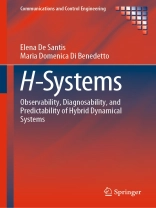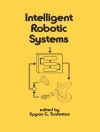This book focuses on the observability of hybrid systems. It enables the reader to determine whether and how a hybrid system’s state can be reconstructed from sometimes necessarily partial information. By explaining how available measurements can be used to deduce past and future behaviours of a system, the authors extend this study of observability to embrace the properties of diagnosability and predictability.
H-systems shows how continuous and discrete dynamics and their interaction affect the observability of this general class of hybrid systems and demonstrates that hybrid characteristics are not simply generalizations of well-known aspects of traditional dynamics. The authors identify conditions for state reconstruction, prediction and diagnosis of the occurrence of possibly faulty states. The formal approach to proving those properties for hybrid systems is accompanied by simple illustrative examples. For readers who are interested in the use of state estimation for controller design, the book also provides design methods for hybrid state observers and covers their application in some industrial cases.
The book’s tutorial approach to the various forms of observability of hybrid systems helps to make H-systems of interest to academic researchers and graduate students working in control and to practitioners using control in an industrial environment.
Inhaltsverzeichnis
Chapter 1. Introduction.- Chapter 2. H-systems.- Chapter 3. Discrete Structure of H
-systems and Background on Finite State Machines.- Chapter 4. Observability, Diagnosability and Predictability of Finite State Machines.- Chapter 5. Extending Diagnosability Properties for Finite State Machines.- Chapter 6. Observability of H
-systems.- Chapter 7.Continuous Dynamics Distinguishability.- Chapter 8. Enriching Discrete Information in H
-systems.- Chapter 9. Observability Characterization for H
-systems.- Chapter 10. Relaxing the Observability Notion.- Chapter 11. Diagnosability and Predictability for H
-systems.- Chapter 12. Observer Design for LH
-systems.- Chapter 13. Some Applications to Automotive Control.- Index.
Über den Autor
Elena De Santis is a Full Professor in Systems and Control Engineering with the Department of Information Engineering, Computer Science and Mathematics (DISIM), University of L’Aquila Since 2019, she has been the Director of the Italian Center of Excellence for Research DEWS “Architectures and Design methodologies for Embedded controllers, Wireless interconnect and System-on-Chip”. She graduated (summa cum laude) in Electrical Engineering from the University of L’Aquila in 1983 and joined the same university as an assistant professor in 1987. Since then, she has published more than 100 papers on analysis, control and optimization of constrained and uncertain dynamic systems, model management for decision support systems, positive systems, dynamic games, hybrid and switching systems. She has been a member of the IEEE since 1999 (elevated to the rank of Senior Member in 2006) and of the IFAC TC 1.3 Committee on Discrete Event and Hybrid Systems. She has served as a member of numerous conference program committees and has been a member of the editorial board of the European Journal of Control. She was a guest editor of the Special Issue: “Observability and observer-based control of hybrid systems”, Int. J. of Robust and Nonlinear Control, 19(4), 2009, and coauthor (with M.D. Di Benedetto) of the monograph Observability of Hybrid Dynamical Systems, 2016. On the same topic of observability of hybrid systems, she has chaired and/or organized sessions in major international conferences.
Maria Domenica Di Benedetto is a Full Professor of Automatic Control at the University of L’Aquila (Italy). She obtained her Ph D degree in Electrical Engineering in 1981 and the “Doctorat d’Etat ès Sciences” in 1987, both from Université de Paris-Sud (now Université Paris-Saclay, France). She was Mc Kay Professor from 1990 to 1995 and Adjunct Professor from 1995 to 2002, at the University of California, Berkeley. She held visiting positions at MIT, the University of Michigan Ann Arbor, and Ecole Nationale Supérieure de Mécanique in Nantes (France).
She founded and was the Director of the Italian Center of Excellence for Research DEWS ‚Architectures and Design methodologies for Embedded controllers, Wireless interconnect and System-on-Chip‘ at the University of L’Aquila, from 2001 to 2019. She was the President of the Italian Association of Researchers in Automatic Control (SIDRA) from 2013 to 2019, and has been the President of the European Embedded Control Institute since 2009. Professor Di Benedetto is an IEEE Life Fellow and an IFAC Fellow. She has been serving the IEEE-CSS as Vice-President since 2021. She is a Distinguished Lecturer of the IEEE-CSS. She is Chair of the IFAC Nichols Medal Selection Committee and a member of the IFAC Fellow Selection Committee for the 2020-2023 triennium. She has been a member of the European Control Award Committee since 2021.
Professor Di Benedetto’s research interests are in the areas of nonlinear and hybrid systems control theory, diagnosability and predictability in cyber-physical systems, and applications to smart grids, traffic control, and automotive and biological systems. On these topics, she has authored or co- authored more than 300 scientific papers in international journals, edited volumes and conferences. Professor Di Benedetto has been active in fostering the development of Hybrid Systems theory and control and participated in several pioneering European projects and in the Networks of Excellence HYCON and HYCON2, where she has been a Member of the Governing Board and of the Executive Committee. She is Editor of the IEEE Press Series on Control Systems Theory and Applications, Senior Editor of the IFAC Nonlinear Analysis: Hybrid Systems, and Member of the Editorial Board of the International Journal of Robust and Nonlinear Control.












